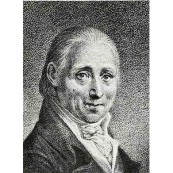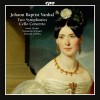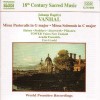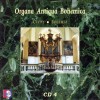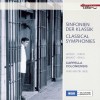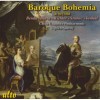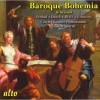Composers
Johann Baptist Vanhal (Jan Křtitel Vaňhal) also spelled Waṅhal (the spelling the composer himself and at least one of his publishers used), Wanhal or Wanhall (May 12, 1739–August 20, 1813) was an important classical music composer. He was born in Nechanice, Bohemia, and died in Vienna.
Born in Nechanice, Bohemia, to a Czech peasant family, Vanhal received his early training from a local musician. From these humble beginnings he was able to earn a living as a village organist and choirmaster. The Countess Schaffgotsch, who heard him playing the violin, took him to Vienna in 1760, where she arranged lessons in composition with Carl Ditters von Dittersdorf. Further patronage helped him to travel and gain further knowledge of music and by the age of 35, he was moving in exalted musical company: it is reported he played quartets with Haydn, Mozart, and Dittersdorf.. Vanhal tailored his output to economic realities of the day and ceased writing symphonies in the late-1770s. He wrote three operas: Il Demofoonte (1770), Il trionfo di Clelia (1770), and The Princess of Tarento. In the 1770s, Vanhal met the contrabassist Johannes Matthias Sperger and wrote a double bass concerto for him. The English music historian Charles Burney visited Vanhal in 1772. Mozart performed Vanhal's Violin Concerto in B flat in Augsburg in 1777. In or around 1784, Haydn, Dittersdorf, Mozart and Vanhal played string quartets together; Haydn and Dittersdorf played the violins, Mozart the viola, and Vanhal cello. The recorder of this event, the composer and tenor Michael Kelly, stated that they played well but not outstandingly together, but the image of four of the great composers of the time all joined in common music-making is still a classic image of the Classical era.
Vanhal was reported to have suffered from an unspecified nervous disorder, which eventually went away, but which gave rise to the opinion held by Burney and others that the quality of Vanhal's compositions deteriorated with the disappearance of his condition. Scholars such as Paul Bryan find that "the quality and quantity of the serious works he [Vanhal] composed after 1770, ... belie that assertion.
Recently Added
Biography
Johann Baptist Vanhal (Jan Křtitel Vaňhal) also spelled Waṅhal (the spelling the composer himself and at least one of his publishers used), Wanhal or Wanhall (May 12, 1739–August 20, 1813) was an important classical music composer. He was born in Nechanice, Bohemia, and died in Vienna.
Born in Nechanice, Bohemia, to a Czech peasant family, Vanhal received his early training from a local musician. From these humble beginnings he was able to earn a living as a village organist and choirmaster. The Countess Schaffgotsch, who heard him playing the violin, took him to Vienna in 1760, where she arranged lessons in composition with Carl Ditters von Dittersdorf. Further patronage helped him to travel and gain further knowledge of music and by the age of 35, he was moving in exalted musical company: it is reported he played quartets with Haydn, Mozart, and Dittersdorf.. Vanhal tailored his output to economic realities of the day and ceased writing symphonies in the late-1770s. He wrote three operas: Il Demofoonte (1770), Il trionfo di Clelia (1770), and The Princess of Tarento. In the 1770s, Vanhal met the contrabassist Johannes Matthias Sperger and wrote a double bass concerto for him. The English music historian Charles Burney visited Vanhal in 1772. Mozart performed Vanhal's Violin Concerto in B flat in Augsburg in 1777. In or around 1784, Haydn, Dittersdorf, Mozart and Vanhal played string quartets together; Haydn and Dittersdorf played the violins, Mozart the viola, and Vanhal cello. The recorder of this event, the composer and tenor Michael Kelly, stated that they played well but not outstandingly together, but the image of four of the great composers of the time all joined in common music-making is still a classic image of the Classical era.
Vanhal was reported to have suffered from an unspecified nervous disorder, which eventually went away, but which gave rise to the opinion held by Burney and others that the quality of Vanhal's compositions deteriorated with the disappearance of his condition. Scholars such as Paul Bryan find that "the quality and quantity of the serious works he [Vanhal] composed after 1770, ... belie that assertion.
